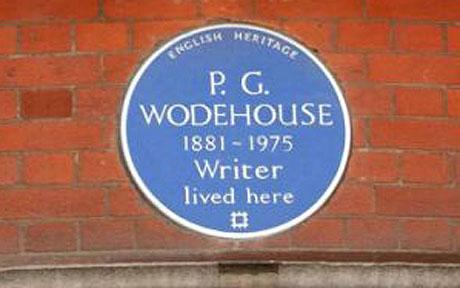P G Wodehouse will always have the last laugh
Charles Moore

P G Wodehouse is the patron saint of those who live by the pen
There is so much to admire in P G Wodehouse ¾ mainly that he was funny, and
that he had an almost perfect mastery of the English language. In this
little show at Heywood Hill bookshop in Mayfair, you can see the dedication
which Evelyn Waugh inscribed in his war trilogy in 1961: "For P G Wodehouse
D Lit, The head of my profession." He was right.
For those of us who live by the pen, Wodehouse is our patron saint for an
additional reason. Although he must have loved writing, or at least been
addicted to it, he wrote for money, and not for some annoying higher
motive.
His success is inspiring. After working very briefly in what is now HSBC,
he lived for the next 70 years by his published words. In 1917 ¾ the bills
are on display in the exhibition ¾ he had five musicals running on
Broadway. He published 70 novels, 20 plays and hundreds of short stories
and lyrics. More than 30 years after his death, the demand continues. Last
year, 44 Wodehouse titles were republished, and Everyman is doing a
beautiful edition of the whole lot. He thought carefully about money. Here
can be seen his calculations of his earnings for November 1906. They come
to £38 10 shillings, which is reckoned to be £3,085 in today's money ¾ not
bad for a man just starting out. Eventually he became very rich. I believe
next year's scholarly edition of his letters, including many new ones to
his agent, will show his ingenious interest in his royalties and advances.
"Plum" also paid endless attention to detail. On display is a letter to the
novelist Arnold Bennett, thanking him for his praise. "I can never see why
printers should do their job so slackly," he writes. In Jeeves and the
Yuletide Spirit, the story Bennett had admired, Bertie Wooster tells Jeeves
that he has been invited somewhere for "the festive s" ¾ it was a habit of
Bertie's to substitute the initial letter for the whole word. The first
edition rendered this as "festives". The American edition changed it to
"festivities". The later Omnibus edition stuck in "Christmas" instead. It
was not until 1999 that the Penguin edition fulfilled the author's
intention.
When he constructed a plot, Wodehouse was curiously abstract. He writes
"hero" and "heroine" in his early plan for Girl in Blue, because he has not
yet thought of their names, and "object" for the thing that was to be
stolen/mislaid. It was only when the structure was to his satisfaction that
he thought about the scenes and people: he had a cool, professional way of
approaching his task. And where editors made silly suggestions, you can see
his tactful firmness at work. For some reason, his US editor did not like
the English title Something Fishy and proposed a different one for the
American edition.
|
